- Home
- Richard Adams
The Plague Dogs Page 12
The Plague Dogs Read online
Page 12
Mr. Powell was undergoing the embarrassment and confusion not infrequently suffered by young officers who, having failed, through nervousness, inexperience and a certain misplaced respect, to press older (and gruffer) subordinates with awkward questions, later find themselves confronted with the same questions from their own seniors.
"Well, that occurred to me, too, actually; but the spring's broken all right--he showed it to me."
"You're sure he didn't break it himself?"
"I don't see why he'd do that, chief."
"Well, because he realized on Saturday that he hadn't shut the door properly on Friday, of course," said Dr. Boycott, allowing Mr. Powell to perceive his impatience at his subordinate's having failed to think of this for himself.
"We can't be sure of that, no," replied Mr. Powell. "But if he did, he'd never admit it, would he?" This answer, he felt, must surely end that particular line of inquiry.
"But did you ask him?" persisted Dr. Boycott, neatly reappearing, as it were out of the bracken, at a fresh point along the line.
"Well, no--not exactly."
"Well, either you did or you didn't."
Dr. Bovcott stared over his glasses and under his raised eyebrows. The thought crossed Mr. Powell's mind that it was a pity that one could not, as in chess, resign, and thereupon at once resume a life in which the blunders leading to the resignation, however foolish, became mere fragments of a concluded parenthesis.
"Well, anyway," resumed Dr. Boycott at length, with the air of one obliged to struggle patiently on in a situation rendered virtually impossible by another's incompetence, "the two dogs got out of seven-three-two's pen. What happened then?"
"Well, then they must have run right through the block, 'cause they'd knocked over a box of mice in the pregnancy unit--"
"And you've told Walters about that, have you?" asked Dr. Boycott, with a sigh suggestive of a state of mind to which no further revelations of folly could come as any surprise.
'Oh, yes, first thing," answered Mr. Powell, catching at this straw for an opportunity to speak in a matter-of-course tone, as though it had never occurred to him that his efficiency or reliability could come under criticism.
"I'm glad to hear that, anyway," countered Dr. Boycott, suggesting, like an Impressionist painter, with one stroke, a host of things, unnecessary to define, which he had nor been glad to hear. "How did they get out of the block and where?"
"Nobody knows," said Mr. Powell expansively, as though, having referred the matter in vain to New Scotland Yard, the Colditz Society and the staff of Old Moore's Almanack, he had been reluctantly compelled to abandon an enigma more baffling than that of the Mary Celeste.
Dr. Boycott clicked his tongue once, loudly, with the air of a super-camel which, while daily enduring the unendurable, can surely be excused if some momentary plaint involuntarily escapes its lips as the last straw is piled on.
"You mean you and Tyson don't know?"
"Well, yes," replied the toad beneath the harrow.
"You're sure they didn't get into Goodner's place?" asked Dr. Boycott, suddenly and sharply.
"Certain," replied Mr. Powell with equal promptitude.
"You're absolutely sure?"
"Yes, and so is he. I've already spoken to him. He says the cultures--"
"All right," said Dr. Boycott, raising one hand to stem the tedious flood of unnecessary and time-consuming detail, the purpose of which--his tone conveyed--he perceived to be nothing but a feeble attempt at ingratiation. "He's content, then. Thank goodness for that." He got up, put his hands in his pockets, walked across to the window and sat on the radiator. The actions suggested that Mr. Powell, while by no means off the carpet, was no longer, as it were, so completely on it--his superior now having need (faute de mieux, of course) of his advice.
"You've made quite certain, have you, that they're not hiding in the block or anywhere about the place?"
"As certain as we can be. Tyson and I have both been all over, independently. Of course, they might show up. I mean, they might come back--"
"Yes, they might," said Dr. Boycott reflectively, "and they might be brought back. It's a pity their collars don't carry the address of the station. Perhaps that ought to be changed. Still, it's too late in this case." He paused, and then, in a sharp tone, as though Mr. Powell had failed to reply to a question and already kept him waiting more than long enough, asked, "Well" (Mr. Powell started), "what do you think we ought to do?"
Mr. Powell had, as a matter of fact, got this bit fairly well stitched up. After all, he was required only to have thought of all the possibilities and to proceed to say what they were. He would also need to express some sort of preference, but once he had done this the decision (and the responsibility) would be someone else's.
"We could do nothing at all, or we could go out and search for the dogs ourselves, or we could give a description to all occupants of neighbouring dwellings and farms and ask them to keep a look-out, catch the dogs if they see them and then ring us up; or we could report the thing to the police. We could do all of the last three things," added Mr. Powell sagaciously. "They're not mutually exclusive, of course."
"And what would you do?" persisted Dr. Boycott.
"Well, quite honestly, chief, I think I'd be inclined to do nothing, for the time being. It's ten to one they'll either come back or else turn up somewhere where we can go and collect them; and if they don't, well, then we just have to write them off. The alternative's raising a hue-and-cry all round the neighbourhood, and then we've given ourselves a bad name, possibly all for nothing--I mean, they've been gone more than sixty hours, they may be miles away by now--half-way to Kendal--"
"Suppose they start worrying sheep?" asked Dr. Boycott.
"Then either some farmer shoots them and saves us further trouble, or else he catches them, realizes where they're from and rings us up; in which case we only have to pacify one bloke instead of spilling the beans to the whole district," answered Mr. Powell.
"Well, perhaps that might be best," said Dr. Boycott reflectively. "I don't really want to bother the Director with a thing like this just now. I think it's more than likely either that they'll turn up of their own accord or that someone will bring them in. What did Fortescue say when you told him about eight-one-five?"
"Well, he said it was a nuisance and a lot of time and work down the drain."
"So it is. If they don't show up today," said Dr. Boycott, apparently unconscious that his decision not to sully the fair name of the station by publicizing the escape appeared, on the face of it, to be inconsistent with the high value he was ascribing to the missing subjects of experiment, "the work already done on them will probably be at least partly invalidated. It certainly will in the case of seven-three-two, since that's a conditioning experiment and the immersions were programmed for regular intervals. I don't know about eight-one-five, but I suppose Fortescue wanted to start it on tests today." A sudden thought struck him. "You don't think it's possible that Tyson might have stolen the dogs himself?"
"Well, it did cross my mind, actually, chief, but if he was going in for that sort of thing I don't think he'd start by picking on those two. I mean, he's no fool, and one's had brain surgery and the other's notoriously savage and bad-tempered."
"H'mmm. Well," said Dr. Boycott briskly, going back to his desk and picking up some papers, to mark his dismissal of the matter for the time being, "we'd better get on with something else. Is there anything besides that that you want to talk about?"
"Well, yes, two other things I think I ought to mention," said Mr. Powell, with some slight relaxation of manner. "The first one's that humane trap for grey squirrels that Ag. and Fish, sent us for trial."
"What about it?"
"Well, it's not turning out all that humane, really," said Mr. Powell, with a giggle of embarrassment. "I mean, it's supposed to kill them outright, isn't it? Well, about four times out of ten, it's just sort of slicing--look, I'll try and draw it for you--"
"I'm not really interested in that, to be perfectly honest," replied Dr. Boycott. "It's not work involving any kind of scientific advance or fresh knowledge. Anyway, it'll be several weeks before Ag. and Fish, start asking us for anything. The squirrels won't be pressing them, you know," he added with a slight lightening of tone which drew a relieved smile from Mr. Powell. "You'd better try to work out some kind of modification yourself, to make it reliably lethal, but remember it's got to go on the market at an economic price. Anything else?"
"One other thing, yes, and this will be of interest to you," said Mr. Powell, with an air of "You want the best seats, we have them." "Those dogfish--the ones you wanted for experiments on how they're able to change their coloration to match their backgrounds, remember? Mitchell rang up about half an hour ago to say he's got them and should he deliver them today? I said I'd ask you and let him know later this morning."
"Can Fortescue spare someone this week to carry out the destruction of the selected areas of their brains and the removal of their eyes?" asked Dr. Boycott.
"Yes, he told me Prescott would be available to do it Wednesday."
"Fine. Well, get them sent along right away and see that the necessary tank-space is ready. Oh, and draw up a test programme."
"Right. Er--and about the other thing, chief," said Mr. Powell, hopeful of retrieving some part of his name at least by showing willing despite his lapse.
"Yes?" asked Dr. Boycott, without raising his eyes from his papers.
"Would you like me to let you have a written report? Only I do realize that there certainly are one or two questions outstanding--"
"Don't bother," said Dr. Boycott, maintaining his air of detachment. "I'll have a word with Tyson. What about that monkey, by the way?" he added, changing the subject rapidly enough to suggest that even he felt this last remark to have been a little too insulting and painful to one who could not answer back.
"Well, it went into the cylinder Friday evening, like you said: so it's done two and a half days."
"How's it reacting?"
"It's been thrashing around a bit," replied Mr. Powell, "and--and sort of crying from time to time. Well, making noises, anyhow."
"Is it eating?"
"Tyson hasn't told me otherwise."
"I see," said Dr. Boycott, and returned to his papers.
Tuesday the 19th October
"How far away from them are we now?" whispered Snitter.
"Aye creep an' peep, hinny, creep an' peep." The tod, it seemed, had not spoken at all, but conveyed its reply into Snitter's mind in a telepathic silence. They crawled three feet closer to the edge of the chattering Tarnbeck.
"Are we to go upstream towards the farm now?"
"Na!" The tod, pressed to the ground under a rock, appeared actually to have extended itself flat like a leech and changed its colour to grey. "Heed doon!"
"What?"
"Bide there noo!"
Snitter understood that they were to remain completely still and vigilant in cover. Upstream, in the Tarnbeck, he could hear the Tongue House Farm ducks quacking and blittering somewhere below the wooden footbridge leading across to the meadow below Thrang. He felt acutely conscious of his black-and-white colouring, as conspicuous as a pillar-box at the end of a street. There was a patch of bracken to one side of him and he crawled silently beneath the brown, over-arching fronds.
After a few moments he turned his head towards the crag where the tod had been lying. It was no longer there. Looking cautiously around, he caught sight of it ahead of him, inching forward, chin and belly pressed into the bed of the runlet that trickled down the meadow to drain into the Tarnbeck. Suddenly it stopped, and for a long time lay motionless in the cold water oozing round and under its body. The quacking sounded closer and a moment later Snitter's ears caught the paddling and splashing of the ducks as they drifted and steered in the swiftly flowing beck, thirty yards away at the bottom of the field. He realized that he was trembling. The tod was now closer to the beck by about three lengths of its own body, yet Snitter had not seen it move. He returned his gaze once more towards the tumbling patch of water visible between the alder bushes, where the runlet entered the beck.
Suddenly, floating down from upstream, a duck came into view, turned, steadied itself against the current and dived, the white wedge of its tail wagging from side to side as it searched below the surface. Snitter looked quickly at the place where the tod had been. It was gone. What ought he himself to be doing? He left the cover of the fronds and began to crawl forward as another duck appeared, followed by a brown drake, blue-wing-feathered like a mallard.
The drake and the duck began quarrelling over some fragment which the duck had found and, as they grabbed and quacked, floated three yards further downstream into shallow water. It was here that the tod came down upon them, silent as smoke. It did not seem to be moving particularly fast, but rather like some natural force borne upon the wind or the stream. Snitter dashed forward, but before-long before, it seemed to him--he could reach the beck, the tod had glided into the shallows, grabbed the drake by the neck and dragged it, struggling and clatter-winged, up the bank into the field. Behind rose a crescendo of splashing and the panic-stricken cries of the flock as they fled upstream.
Snitter, two yards up the bank, came face to face with the tod, its mask grotesquely obscured by the thrashing wings and feet of the drake clutched between its teeth. Without relaxing its grip it coughed a shower of small, downy feathers into Snitter's face.
"What--what shall I do? D'you want me to--" Snitter, absurdly, was holding himself poised to rush into the now empty water. The tod lifted the corner of a lip and spoke indistinctly out of one side of its mouth.
"Haddaway hyem noo!"
Without waiting to see whether Snitter had understood, it trotted briskly--but still, as it seemed, without undue haste--downstream, quickly reaching the cover of a bank topped with ash and alder, along the further side of which they began to slink towards the open fell beyond. Once only it stopped, laid down for a moment the now-still quarry, and grinned at Snitter.
"Ye'll soon be waalkin' light as a linnet, lad. Th' next torn'll be yours. Mebbe ye'll get yersel' dosed wi' lead an' aall."
Snitter grinned back.
"Ye divven't say?"
The tod looked down at the carcase. "Can ye pull the feathers off a duck? There's a gey lot o' them. Ah'll hev t' larn ye."
Thursday the 21st October
Rowf lay crouched out of the wind, under a rock two hundred yards from the summit of Dow Crag. The moon was clouded and there was little light--barely enough by which to discern the mouth of the precipitous gully leading up from below. Snitter fidgeted impatiently. The tod was stretched at length, head on front paws.
"You say there's no need to come to grips?" asked Rowf.
"Ne need, hinny. Th' sharper it's runnin', th' sharper it'll go ower. Mind, ye'll be close behind, so ye'll hev te watch it. Tek care o' yersel' ye divven't go doon wi'd." The tod paused and glanced at Snitter. "If th' wee fella there's sharp off his mark, there'll be ne bother."
Rowf looked down once more into the pitch-black depths below, then turned to Snitter.
"Now, look, it'll be coming up the fell as fast as the tod and I can drive it. It's got to be headed and forced down into the gully. It mustn't get past you, or turn back down the fell, d'you understand?"
"It won't," replied Snitter tensely.
"Assa, ye'll manage canny," said the tod, and thereupon set off with Rowf down the hillside.
Snitter took the place under the rock still warm from Rowf's body, and waited. The wind moaned in the funnel of the sheer gully below and blew a scatter of cold rain across his face, smelling of salt and sodden leaves. He stood up, listening intently, and began padding up and down across the gully's head. There were still no sounds of hunting to be heard from the western slope on his other side. He might have been the only living creature between Dow Crag and Seathwaite Tarn.
After a while he became agita
ted. Peering into the darkness and from time to time uttering low whines, he ran a little way towards the summit. Out beyond the foot of the precipice, far below, he could just glimpse the dull glimmering of Goat's Water--one more of the many tanks with which men had dotted this evil, unnatural country. Sniffing along the path, he came across a cigarette end and jumped back with a start as the image of the tobacco man leapt before his mind's nose. Confused, he lay down where he was and for the thousandth time raised one paw to scrabble at the canvas and plaster fixed to his head. His claws found a hold--some wrinkle that had not been there before--and as he tugged there came a sudden sliding movement, a giving way, followed at once by a sensation of cold and exposure across the top of his skull. Drawing back his paw, he found the entire plaster, sodden, black and torn, stuck across the pads. After a few moments he realized what it was and, capering with delight, gripped it in his teeth, chewed it, threw it into the air and caught it, threw it up again and was about to chase after it when suddenly a furious barking broke out on the fell below.
Snitter, jumping round at the noise, realized that he was uncertain of his way back to the mouth of the gully. As he hesitated in the dark, he heard the approaching sound of small hooves clattering over stones, and dashed along the ridge in the direction from which it came. Scarcely had he reached the rock where the tod had left him than the yow came racing uphill, with Rowf snapping at its hind-quarters. Simultaneously, without a sound, the tod appeared from nowhere and lay with bared teeth, watching the yow as it turned towards Snitter, hesitated and stopped. Snitter leapt at it and all in a moment the yow plunged headlong into the blackness of the gully. Rowf, hard on its heels, disappeared also. There followed a rattling and falling of stones and gravel and then a single, terrified bleat which, even as it diminished, was cut suddenly short. Rowf, the whites of his eyes showing in the faint light, reappeared and flung himself down, panting, not a yard from the edge.
"I saw it fall. Liver and lights, I couldn't stop! I nearly went over myself. Well done, Snitter! You stopped it turning. Why--" He raised his head, staring at Snitter incredulously. "What on earth's happened to you?"

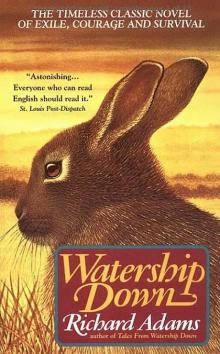 Watership Down
Watership Down Tales From Watership Down
Tales From Watership Down Maia
Maia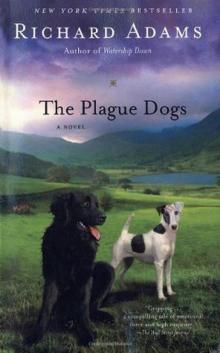 The Plague Dogs
The Plague Dogs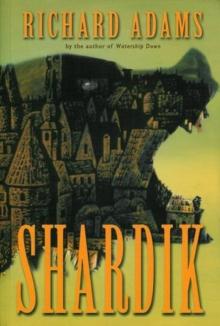 Shardik
Shardik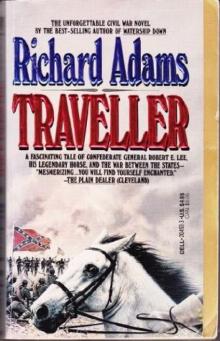 Traveller
Traveller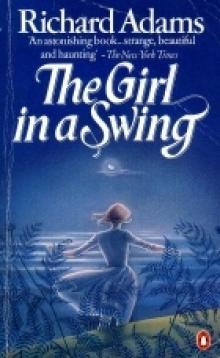 The Girl in a Swing
The Girl in a Swing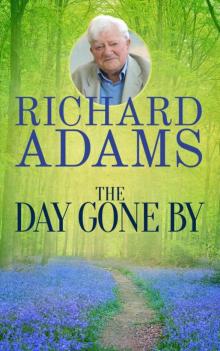 The Day Gone By
The Day Gone By Daniel
Daniel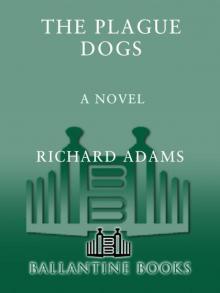 The Plague Dogs: A Novel
The Plague Dogs: A Novel